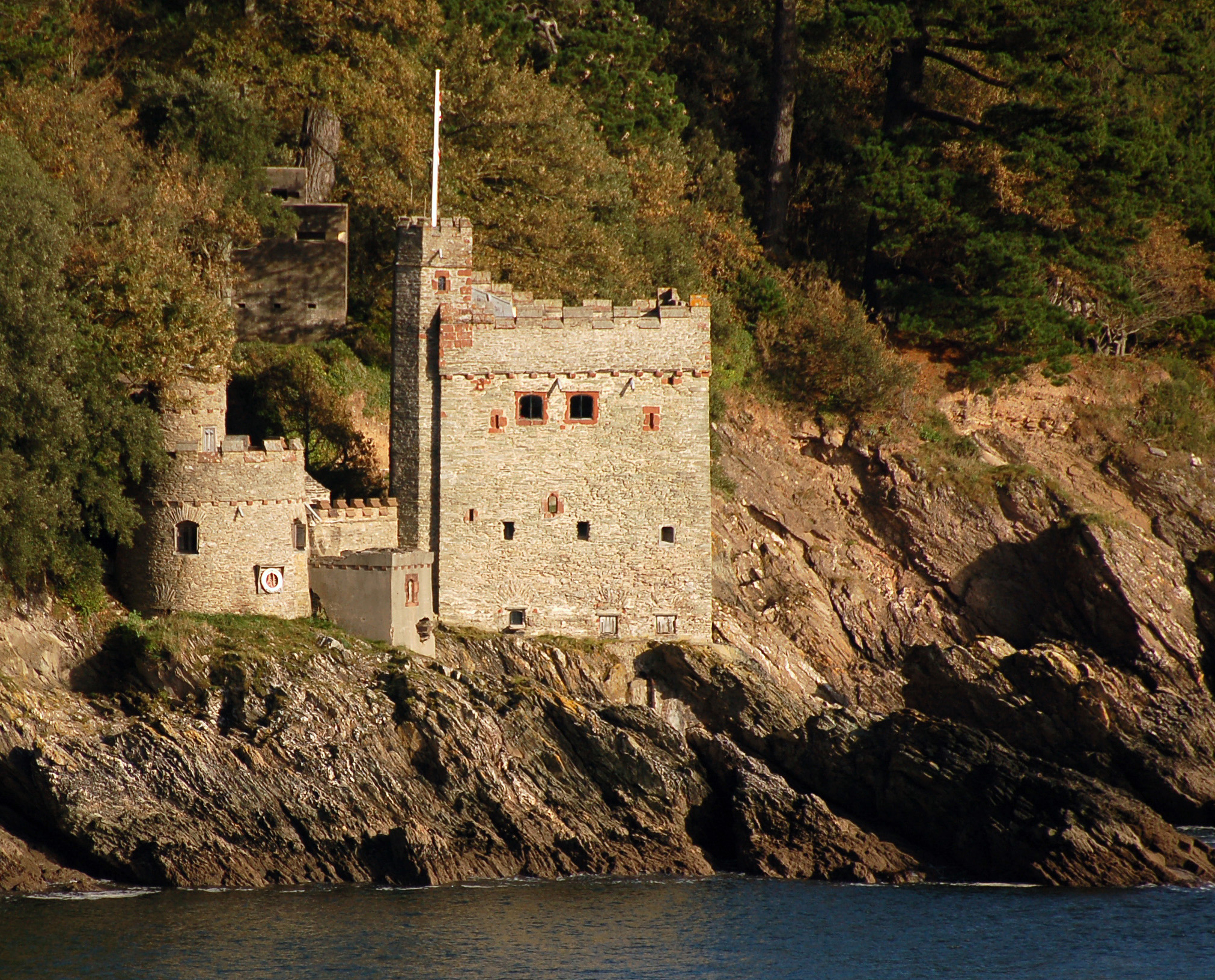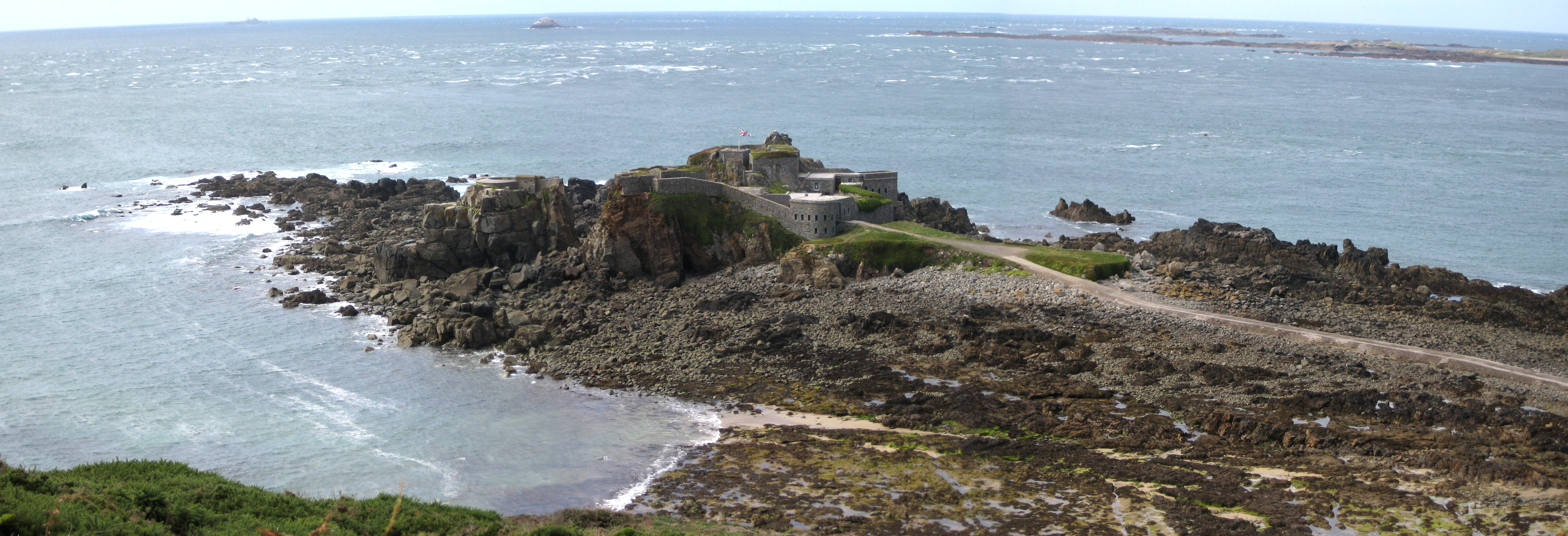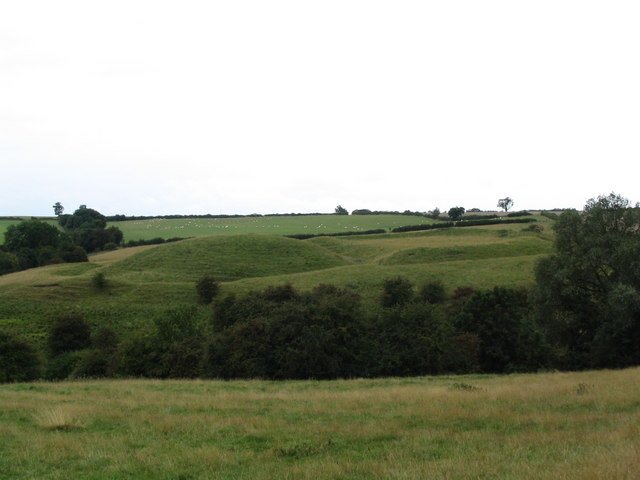|
Kingswear Castle
Kingswear Castle is an artillery fort, built to protect Dartmouth harbour in Devon, England. It was constructed between 1491 and 1502 in response to the threat of French attack and was one of the first purpose-built artillery forts in Britain. By the end of the 16th century, however, improvements in the range of artillery weapons had reduced the utility of the castle. It took part in the English Civil War and continued to be armed until the early 18th century, but fell into ruin. Restored as a summer house in 1855, in the 21st century it is managed by the Landmark Trust as a holiday let. History 15th–16th centuries Kingswear Castle was built to protect the coastal town of Dartmouth in Devon. In the medieval period, the town's harbour, located in the estuary of the River Dart, was an important trading and fishing port, able to hold up to 600 vessels. Fears of a French invasion, combined with the hope of retaining a valuable royal subsidy, led the town to develop Dartmouth Cas ... [...More Info...] [...Related Items...] OR: [Wikipedia] [Google] [Baidu] |
Landmark Trust
The Landmark Trust is a British building conservation charity, founded in 1965 by Sir John and Lady Smith, that rescues buildings of historic interest or architectural merit and then makes them available for holiday rental. The Trust's headquarters is at Shottesbrooke in Berkshire. Most Trust properties are in England, Scotland and Wales. Several are on Lundy Island off the coast of north Devon, operated under lease from the National Trust. In continental Europe there are Landmark sites in Belgium, France and Italy. Five properties are in the United States — all in Vermont — one of which, Naulakha, was the home of Rudyard Kipling in the 1890s. The Trust is a charity registered in England & Wales and in Scotland. The American sites are owned by an independent sister charity, Landmark Trust USA. There is also an Irish Landmark Trust. Those who rent Landmarks provide a source of funds to support restoration costs and building maintenance. The first rentals were in 196 ... [...More Info...] [...Related Items...] OR: [Wikipedia] [Google] [Baidu] |
Devon
Devon ( , historically known as Devonshire , ) is a ceremonial and non-metropolitan county in South West England. The most populous settlement in Devon is the city of Plymouth, followed by Devon's county town, the city of Exeter. Devon is a coastal county with cliffs and sandy beaches. Home to the largest open space in southern England, Dartmoor (), the county is predominately rural and has a relatively low population density for an English county. The county is bordered by Somerset to the north east, Dorset to the east, and Cornwall to the west. The county is split into the non-metropolitan districts of East Devon, Mid Devon, North Devon, South Hams, Teignbridge, Torridge, West Devon, Exeter, and the unitary authority areas of Plymouth, and Torbay. Combined as a ceremonial county, Devon's area is and its population is about 1.2 million. Devon derives its name from Dumnonia (the shift from ''m'' to ''v'' is a typical Celtic consonant shift). During ... [...More Info...] [...Related Items...] OR: [Wikipedia] [Google] [Baidu] |
Sir John Fowell, 2nd Baronet
Sir John Fowell, 2nd Baronet (14 August 1623 – 8 January 1677) of Fowelscombe in the parish of Ugborough in Devon, was thrice elected a Member of Parliament for Ashburton in Devon, between 1659 and 1677. He fought in the Parliamentary army during the Civil War and following the Restoration of the Monarchy was appointed in 1666 by King Charles II Vice-Admiral of Devon. Origins Fowell was the eldest son and heir of Sir Edmund Fowell, 1st Baronet (1593-1674), of Fowelscombe, by his wife Margaret Poulett, a daughter of Sir Anthony Poulett (1562–1600) (''alias'' Pawlett, etc.), of Hinton St George in Somerset, Governor of Jersey and Captain of the Guard to Queen Elizabeth I and a sister of John Poulett, 1st Baron Poulett (1585–1649). Career He was a colonel in the Regiment of Foot in the Parliamentary army during the Civil War and was governor of Totnes. In 1659 he was elected Member of Parliament for Ashburton, Devon, in the Third Protectorate Parliament. He was re-ele ... [...More Info...] [...Related Items...] OR: [Wikipedia] [Google] [Baidu] |
Tourist Attractions In Devon
Tourism is travel for pleasure or business; also the theory and practice of touring, the business of attracting, accommodating, and entertaining tourists, and the business of operating tours. The World Tourism Organization defines tourism more generally, in terms which go "beyond the common perception of tourism as being limited to holiday activity only", as people "travelling to and staying in places outside their usual environment for not more than one consecutive year for leisure and not less than 24 hours, business and other purposes". Tourism can be domestic (within the traveller's own country) or international, and international tourism has both incoming and outgoing implications on a country's balance of payments. Tourism numbers declined as a result of a strong economic slowdown (the late-2000s recession) between the second half of 2008 and the end of 2009, and in consequence of the outbreak of the 2009 H1N1 influenza virus, but slowly recovered until the COVI ... [...More Info...] [...Related Items...] OR: [Wikipedia] [Google] [Baidu] |
Medieval Forts In England
In the history of Europe, the Middle Ages or medieval period lasted approximately from the late 5th to the late 15th centuries, similar to the post-classical period of global history. It began with the fall of the Western Roman Empire and transitioned into the Renaissance and the Age of Discovery. The Middle Ages is the middle period of the three traditional divisions of Western history: classical antiquity, the medieval period, and the modern period. The medieval period is itself subdivided into the Early, High, and Late Middle Ages. Population decline, counterurbanisation, the collapse of centralized authority, invasions, and mass migrations of tribes, which had begun in late antiquity, continued into the Early Middle Ages. The large-scale movements of the Migration Period, including various Germanic peoples, formed new kingdoms in what remained of the Western Roman Empire. In the 7th century, North Africa and the Middle East—most recently part of the Eastern Roman ... [...More Info...] [...Related Items...] OR: [Wikipedia] [Google] [Baidu] |
Castles In Devon
A castle is a type of fortified structure built during the Middle Ages predominantly by the nobility or royalty and by military orders. Scholars debate the scope of the word ''castle'', but usually consider it to be the private fortified residence of a lord or noble. This is distinct from a palace, which is not fortified; from a fortress, which was not always a residence for royalty or nobility; from a ''pleasance'' which was a walled-in residence for nobility, but not adequately fortified; and from a fortified settlement, which was a public defence – though there are many similarities among these types of construction. Use of the term has varied over time and has also been applied to structures such as hill forts and 19th-20th century homes built to resemble castles. Over the approximately 900 years when genuine castles were built, they took on a great many forms with many different features, although some, such as curtain walls, arrowslits, and portcullises, were ... [...More Info...] [...Related Items...] OR: [Wikipedia] [Google] [Baidu] |
List Of Castles In England
This list of castles in England is not a list of every building and site that has "castle" as part of its name, nor does it list only buildings that conform to a strict definition of a castle as a medieval fortified residence. It is not a list of every castle ever built in England, many of which have vanished without trace, but is primarily a list of buildings and remains that have survived. In almost every case the buildings that survive are either ruined, or have been altered over the centuries. For several reasons, whether a given site is that of a medieval castle has not been taken to be a sufficient criterion for determining whether or not that site should be included in the list. Castles that have vanished or whose remains are barely visible are not listed, except for some important or well-known buildings and sites. Fortifications from before the medieval period are not listed, nor are architectural Folly, follies. In other respects it is difficult to identify clear an ... [...More Info...] [...Related Items...] OR: [Wikipedia] [Google] [Baidu] |
Castles In Great Britain And Ireland
Castles have played an important military, economic and social role in Great Britain and Ireland since their introduction following the Norman invasion of England in 1066. Although a small number of castles had been built in England in the 1050s, the Normans began to build motte and bailey and ringwork castles in large numbers to control their newly occupied territories in England and the Welsh Marches. During the 12th century the Normans began to build more castles in stone – with characteristic square keep – that played both military and political roles. Royal castles were used to control key towns and the economically important forests, while baronial castles were used by the Norman lords to control their widespread estates. David I invited Anglo-Norman lords into Scotland in the early 12th century to help him colonise and control areas of his kingdom such as Galloway; the new lords brought castle technologies with them and wooden castles began to be established over th ... [...More Info...] [...Related Items...] OR: [Wikipedia] [Google] [Baidu] |
Grade I Listed Building
In the United Kingdom, a listed building or listed structure is one that has been placed on one of the four statutory lists maintained by Historic England in England, Historic Environment Scotland in Scotland, in Wales, and the Northern Ireland Environment Agency in Northern Ireland. The term has also been used in the Republic of Ireland, where buildings are protected under the Planning and Development Act 2000. The statutory term in Ireland is "protected structure". A listed building may not be demolished, extended, or altered without special permission from the local planning authority, which typically consults the relevant central government agency, particularly for significant alterations to the more notable listed buildings. In England and Wales, a national amenity society must be notified of any work to a listed building which involves any element of demolition. Exemption from secular listed building control is provided for some buildings in current use for worship, ... [...More Info...] [...Related Items...] OR: [Wikipedia] [Google] [Baidu] |
Frederic Bennett
Sir Frederic Mackarness Bennett (2 December 1918 – 14 September 2002) was a British journalist, author, barrister and Conservative politician who served as a Member of Parliament for 35 years. He was appointed a Privy Counsellor in 1985, and a Deputy Lieutenant for Greater London in 1990. He was also Lord of the manor of Mawddwy in Wales. Early years The second son of Sir Ernest Nathaniel Bennett, (died 1947) of Cwmllecoediog, Aberangell, Machynlleth, Wales, by his wife Marguerite (née Kleinwort), Bennett was educated at Westminster School, and Lincoln's Inn, and was called to the English Bar in November 1946. He subsequently served as an Advocate in the High Court of Southern Rhodesia from March 1947, and in 1947 he made the first overland car journey from South Africa to England. From 1947 to 1949 he was an Official Observer in the Greek Civil War, becoming diplomatic correspondent for the ''Birmingham Post'' from 1950 to 1952. Later a director in various financial ... [...More Info...] [...Related Items...] OR: [Wikipedia] [Google] [Baidu] |
Royal Marines
The Corps of Royal Marines (RM), also known as the Royal Marines Commandos, are the UK's special operations capable commando force, amphibious light infantry and also one of the five fighting arms of the Royal Navy. The Corps of Royal Marines can trace their origins back to the formation of the "Duke of York and Albany's maritime regiment of Foot" on 28 October 1664, and can trace their commando origins to the formation of the 3rd Special Service Brigade, now known as 3 Commando Brigade on 14 February 1942, during the Second World War. As a specialised and adaptable light infantry and commando force, Royal Marine Commandos are trained for rapid deployment worldwide and capable of dealing with a wide range of threats. The Corps of Royal Marines is organised into 3 Commando Brigade and a number of separate units, including 47 Commando (Raiding Group) Royal Marines, and a company-strength commitment to the Special Forces Support Group. The Corps operates in all environments an ... [...More Info...] [...Related Items...] OR: [Wikipedia] [Google] [Baidu] |
Second World War
World War II or the Second World War, often abbreviated as WWII or WW2, was a world war that lasted from 1939 to 1945. It involved the World War II by country, vast majority of the world's countries—including all of the great powers—forming two opposing military alliances: the Allies of World War II, Allies and the Axis powers. World War II was a total war that directly involved more than 100 million Military personnel, personnel from more than 30 countries. The major participants in the war threw their entire economic, industrial, and scientific capabilities behind the war effort, blurring the distinction between civilian and military resources. Air warfare of World War II, Aircraft played a major role in the conflict, enabling the strategic bombing of population centres and deploying the Atomic bombings of Hiroshima and Nagasaki, only two nuclear weapons ever used in war. World War II was by far the List of wars by death toll, deadliest conflict in hu ... [...More Info...] [...Related Items...] OR: [Wikipedia] [Google] [Baidu] |









